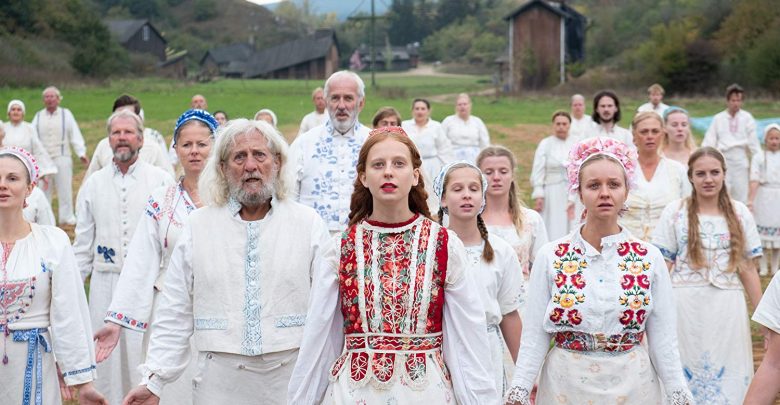Film Review: Midsommar
 A24
A24Directed by: Ari Aster
Starring: Florence Pugh, Jack Reynor, William Jackson-Harper, Vilhelm Blomgren & Will Poulter
Like travelling abroad, the follow-up to psychological horror Hereditary is a challenging experience.
From the very beginning, it’s clear that Midsommar is an ambitious film. It starts with shots of a forest in winter accompanied by haunting choir music, then it abruptly cuts to the exterior of a house and the blaring sound of a phone ringing. What this sequence demonstrates is the kind of abstract association of ideas that this film is centered upon. While Midsommar can certainly be described as a horror movie, it’s actually far more interested in exploring the psychology of failing relationships, cult-like communities, and how the two can go hand-in-hand. That said, this film is also highly aware of horror movie conventions, so it does deliver, in nausea-inducing ways, on some of the genre’s more gruesome staple elements.
Young adults Dani and Christian are in a relationship that is satisfying neither of them: Dani (Florence Pugh) is still coping with a recent traumatic incident, and budding anthropologist Christian (Jack Reynor) is not giving her the support that she needs. When the two get the chance, along with three of their friends, to participate in a week-long midsummer festival in a remote Swedish village, Dani and Christian’s relationship will finally suffer its long-awaited breakup in a most disturbing fashion.
Other elements of the film include Christian and his friend Jacob (William Jackson-Harper) trying to conduct an ethnographic study, questioning the limits of cultural relativism, and American tourists being rude to their hosts. The film also explores drug-induced psychosis, ancient runes, incest, mental illness, and cult mentalities. In short, Midsommar covers a lot of ground, making for a challenging viewing experience. Upon first viewing, I’m not sure if I find this film all that rewarding, but I’m compelled to go watch this a second time, so at least there is that.
However, what I can say with confidence is that Midsommar does deliver on the horror side of things, and does so in an original way. For instance, reviewers have put much emphasis on the fact that the film is almost exclusively set in bright daylight, and this does indeed create an unsettling contrast to the bizarre situations on display. Seeing horrific things happen in plain sight makes them seem more normal, which in turn makes the viewing experience all that more disturbing.
For the locals engaging in these midsummer festivities, there is nothing odd about what they’re doing: this is their culture, and it’s a part of who they are as much their white clothes and flower crowns, so why hide it? It just makes sense in the story world for this whole pageantry take place in daylight, in full view of everyone and everything, because the locals have nothing to hide from themselves. We the viewers, Dani, Christian and their friends, are the outsiders in this situation.
It’s up to us to change our view of things in order to “fit in”, or at least to understand what is going on and why these horrific events are happening. For some viewers, this may be too much to ask, but for others, this will be exactly why they bought their film ticket.




